KEEP ON TRUCKIN’
BY LEE HART • PHOTOS BY ANTHONY HOULE PHOTOGRAPHY
While statistics are limited, some industry insiders estimate about 50 per cent of farmers haul their own grain, while the other 50 per cent rely fully or partly on commercial trucking services, popularly referred to as custom grain haulers.
Cropping about 5,000 acres near Killam, Roger Chevraux looks for strong service and flexibility in grain haulers. Chevraux’s experience closely reflects what commercial trucking companies say they see in Alberta. Depending on the time of year, he’ll use his own trucks to deliver grain and oilseeds to local elevators. For longer hauls, he hires a commercial trucking company to complete deliveries, particularly at seeding and harvest.
“What I am looking for is a trucking company that has some independence,” said Chevraux. “It takes a bit of time to build that relationship, but if I am hiring a commercial grain truck it’s because I’m busy. I want the trucker to have the independence to come into the yard, get the grain loaded on the truck and then head out for the delivery. If I have to stop what I’m doing to help the trucker, then that’s not really helping me.”
Hiring mostly commercial truckers allowed Chevraux the flexibility to work on- and off-farm simultaneously for several years. Now, as a full-time farmer, he handles much of his own trucking requirements. He has a couple of smaller tandem trucks, as well as a tri-axle truck that can carry about 32 tonnes of grains and oilseeds. He is planning to upgrade to a Super B unit.
Chevraux feels fortunate on all fronts. He and his hired man both have class 1 licences. He has also hired the same custom grain hauler for the past several years. A retired farmer, he is conveniently familiar with the Chevraux yard.
“I can just leave the auger in the yard and sometimes he brings his own drag auger,” said Chevraux. “I tell him what bin I want to move, he’ll get the grain loaded, clean out the bin and be on his way without my help. If something breaks, he can fix it, and he’s even gone for fuel when the auger has run out of gas.
“That’s the kind of independence I’m looking for in a trucking company,” he added. “The odd time a grain broker has sent a trucker to the yard and some of those drivers won’t even get out of the cab. They expect me to get everything set up. And maybe that’s not such a big deal in January when I have more time, but if it’s at seeding or at harvest, I really don’t have time for that.
“The tri-axle truck is fine for a relatively short haul, like five miles [eight kilometres] to the elevator or even 45 miles [72 kilometres] into Camrose with a load,” said Chevraux. “But then it depends what I’m hauling and how much is needed.
“If I’m hauling to Rahr Malting at Alix, that’s about 70 miles [113 kilometres] one way. Realistically, I could make about two trips in a day with my truck. If that’s all the malt barley they need, I can handle it. But if they are looking for 100 tonnes and need it within a day or so, then I’ll hire a commercial trucker.” Also, if Chevraux is selling feed barley into southern Alberta, he usually deals with a grain broker who arranges for a commercial trucker.
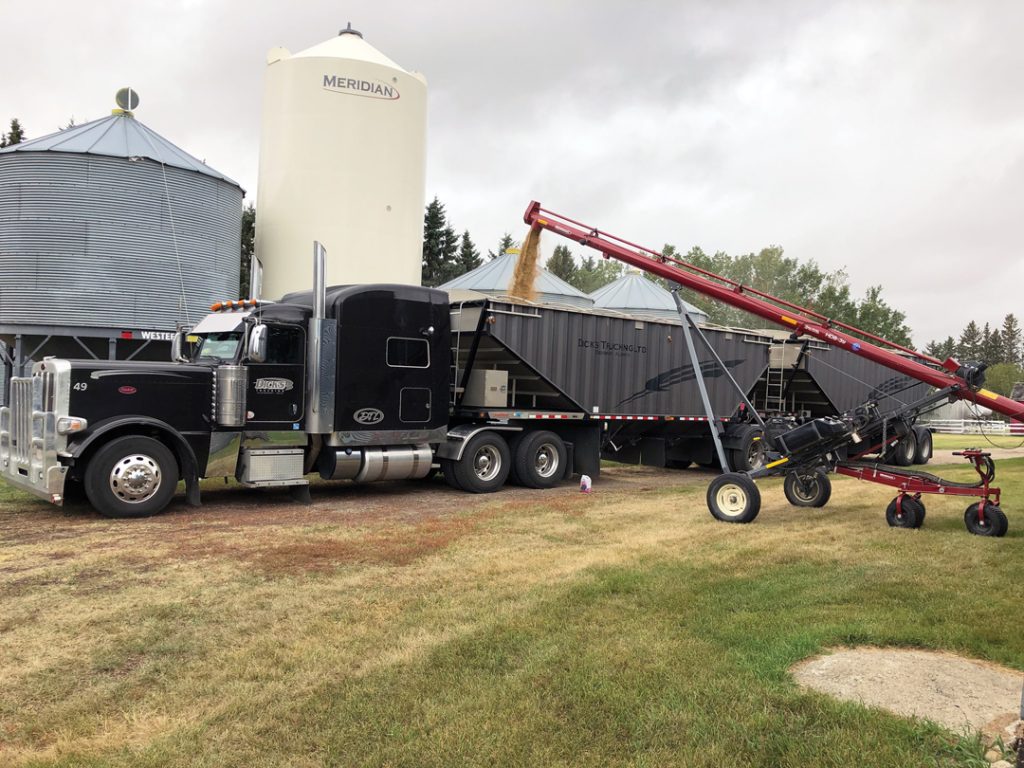
The Dick’s Trucking fleet consists of 20 company owned vehicles, and the company also employs several lease operators. Operators Randy and Karie Dick said young farmers looking to diversify their earnings are taking greater interest in commercial grain hauling.
HAUL OF FAMERS
Randy and Karie Dick of Dick’s Trucking in Didsbury have owned their own commercial trucking business for 30 years. Randy is the third generation of his family to haul agricultural commodities. His grandfather Joe was a cattle buyer and hauled the animals starting in 1935. He was followed by Randy’s father Melvin who was primarily in the grain-hauling business for 28 years. He sold a truck to Randy in 1990.
“We started out in 1990 with one truck, which was a 1986 Western Star tandem with a grain box and pup trailer and it grew from there,” he said. Travelling the roads of Western Canada, they now have 30 Super B tractor-trailer units, each with a payload capacity of about 100,000 pounds, or 45 tonnes.
The Dick’s Trucking fleet includes 20 company-owned tractors and 10 owned by lease operators. All of the grain trailers used by the fleet are company owned. “The company used to own more of its own trucks, but we figured it was good to include lease operators in the business and have more balance,” said Randy.
Serving customers across Western Canada, about 60 per cent of the company’s business involves moving agricultural commodities for grain companies. Close to 40 per cent is moving grain for farmers with operations in the 1,200- to 60,000-acre (490- to 24,300-hectare) range. “Business seems to be fairly consistent over the year, although we run into peak periods during spring seeding and fall harvest,” he said.
Starting out as a lease operator with his own truck in the late 1990s, Andrew Scafe launched Go-Fer Grain Transports of Red Deer in 2001. He combined his grain hauling and custom silage services in 2007, becoming Go-Fer Ag Services.
Scafe owns a Super B tractor-trailer unit and he employs three to four truck-lease operators. Two of the lease operators own their own trailers, while two use trailers owned by the business. “Along with being the owner, I basically co-ordinate and serve as a dispatcher for the other operators,” he said.
Scafe said his strategy is to keep the business simple and more profitable by working closer to home. “I learned over the years the further you have to haul grain, the less money you make,” he said. “The odd time we might make a trip to Edmonton [about 150 kilometres away] but 95 per cent of time we work within 100 to 120 kilometres of Red Deer.”
While some truck owners think long-haul is lucrative, Scafe appreciates sleeping in his own bed. “I think there is something to be said for being home every night,” he said. “On longer hauls you might gross more money, but then your expenses are way higher, too. Depending on the time of year, our drivers may be working 10- to 14-hour days but they are home at night and we do our best to make sure they have most weekends off. At certain times of the year, we can be ferociously busy for a few days getting crop delivered to the elevator and then just as suddenly it can be quiet.”
Scafe and Dick both have similar observations about working with farmers. Both have been impressed with the improvement in farm facilities over the past two to three decades.
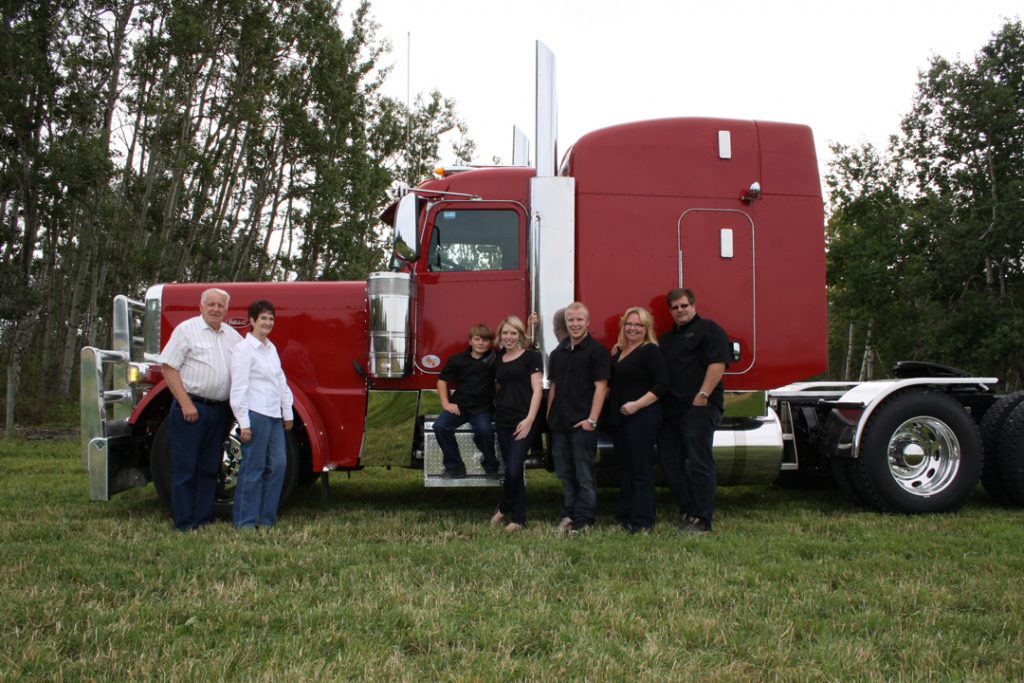
From left to right: Mel, Elaine, Joey, Amber, Kyle, Karie and Randy Dick. Randy and Karie have owned and operated Dick’s Trucking of Didsbury for three decades. Photo courtesy of Dick’s Trucking.
“There used to be times you’d show up with a B-train and you’d have to park both trailers on the road and take one in at a time to get loaded,” said Dick. “Yards were smaller, augers were smaller. Sometimes you might be at a farm nearly half a day. Today, with many of these operations, you’ve got plenty of room, good equipment and it might only take 15 or 20 minutes to get loaded.”
Scafe finds farmers good to work with, and said it’s important to provide quality customer service in return. “Most farmers are fairly flexible in that if you don’t get a job done today, it is fine with them if you come back tomorrow,” said Scafe. “I appreciate that flexibility, so you want your drivers to sometimes do a bit extra as needed.”
Both Scafe and the Dicks said it is important to develop good working relationships with repeat customers, provide extra services as needed and develop trust. Scafe said he was contacted by a vacationing client who trusted him to make a pickup and delivery happen. “The farmer calls from Palm Springs, tells me what bin needs to be emptied and where it is to be delivered and he leaves it with me,” said Scafe. “It is good to develop that trust with your clients.”
Working with lease operators helps the two businesses spread out the cost and risks. The lease operators cover their own costs for fuel, insurance and registration and are paid a percentage for each load.
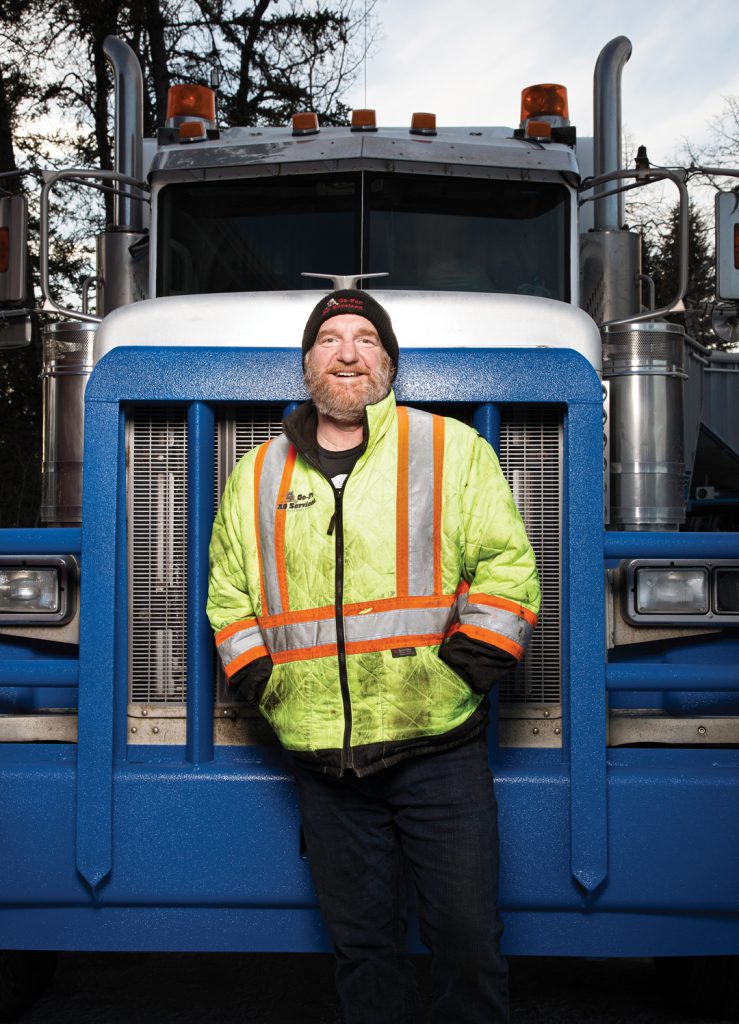
Andrew Scafe of Go-Fer Ag Services focuses on developing good working relationships with his Red Deer area customers.
With Go-Fer Ag Services, for example, for a typical short haul within about 24 kilometres, Scafe charges the farmer $9 per loaded tonne. If the driver is using one of Go-Fer’s trailers, Scafe takes a percentage cut, and if the driver is using his own tractor and trailer unit, Scafe takes a smaller administration and dispatching fee.
Depending on circumstance, maintenance costs can be shared with lease operators. “I might buy the part, but they’ll get it installed,” he said. “I like drivers to know they have some skin in the game, too.”
Pay rates reflect the fact it’s not cheap to keep a truck on the road. “For our own trucks, we saw the end of a provincial carbon tax a few months ago and now we have a new federal carbon tax, which hits diesel fuel harder than gasoline,” said Dick. “I believe by April it will be costing us 13 cents per litre. We will do our best to absorb that as long as we can.”
Insurance rates are high as well, points out Karie Dick. “We’re probably looking at $8,000 to $10,000 per year per truck for insurance this year, and then the carbon tax is on top of that,” she said. “But we’re not like a courier company that can just pass these costs on to customers. You drive around the country and see there is still crop in the field many places, you know farmers don’t have the cash flow either, so we do our best to hold the line on hauling rates.”
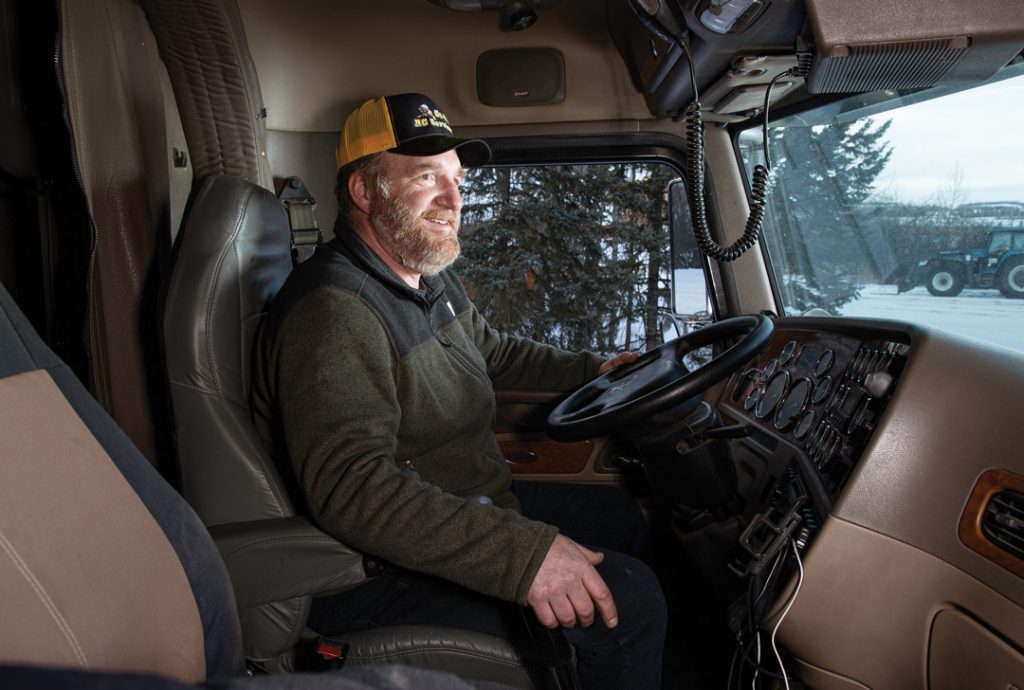
Both Scafe and the Dicks said it is important to develop good working relationships with repeat customers, provide extra services as needed and develop trust.
KIDS IN THE HAUL
While increasing costs appear to be a fact of life, perhaps a greater concern for the whole trucking industry is recruiting the next generation of drivers. And by all accounts, there is a shortage of young workers entering the industry as older truckers retire.
Both Dick’s Trucking and Go-Fer Ag Services operate with a pool of drivers mostly in their 50s and 60s. While they close in on retirement, impediments for young drivers include recent regulation changes. As of March 1, 2019, new drivers must complete Mandatory Entry-Level Training (MELT). Prior to that date, the program was not mandatory for Alberta farmers. The expense for each applicant is about $10,000.
“The real issue after the training is being able to find a job,” said Randy Dick. “The jobs are there, but insurance companies are demanding that drivers have at least three years of driving experience with a clean driving record. But how do they get that driving experience if they can’t drive? I don’t know what is going to happen, but they may need to make this into some type of an apprenticeship program that allows drivers to train while they work.”
And it’s not just an Alberta problem. Some reports predict Canada could be short 34,000 drivers four years from now. “Numbers like these will impact all sectors of transportation, including agriculture,” said Chris Nash, Alberta Motor Transport Association (AMTA) president. “The average age of commercial transport drivers has seen an increase over the past few years. With more and more drivers retiring, now is
the time to increase awareness among those looking for a career or career change and show them industry is open for business.”
As the voice of about 15,000 paid and associate members of the commercial transportation industry, the AMTA is working on a variety of avenues aiding driver recruitment. Industry is encouraging underrepresented population groups to considered the trucking industry. Such initiatives include the Women Building Futures’ Professional Class 1 Driver program.
Dick suggested the able-bodied outlook is not completely bleak. “I’m seeing more often, as young farmers join in the farming operation, that more farms are buying their own grain trucks. They are interested in diversifying the farm and creating additional employment for the next generation.”
While the owners of Dick’s Trucking and Go-Fer Ag Services acknowledge programs such as MELT ensure new drivers are properly trained, there must also be an affordable means for new drivers to acquire experience behind the wheel.
Scafe has first-hand experience with the difficulties faced by new drivers. His 19-year-old son Anders is in the process of getting his class 1 licence. “Even with MELT, it appears his insurance premiums might be double that of an experienced driver,” said Scafe. “The way it is set up now, they don’t make it easy for young people to get into the industry.”
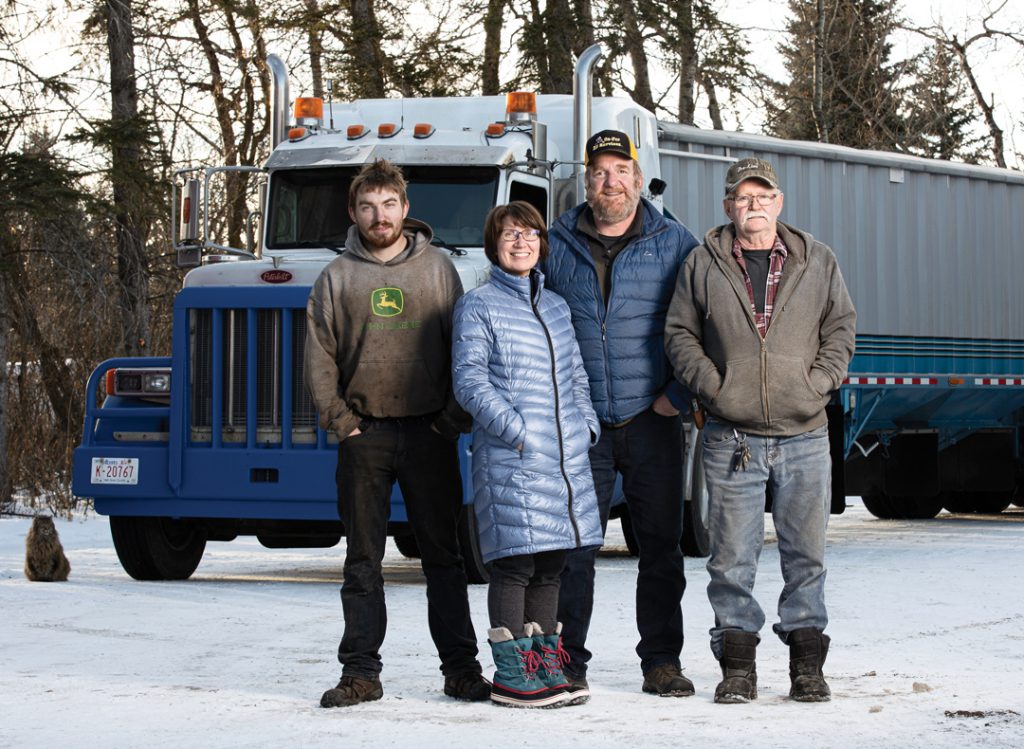
From left to right, Anders, Ingrid and Andrew Scafe prepare for the day’s haul with driver Marcel Lehouillier. A shortage of drivers is a looming problem for the trucking industry.






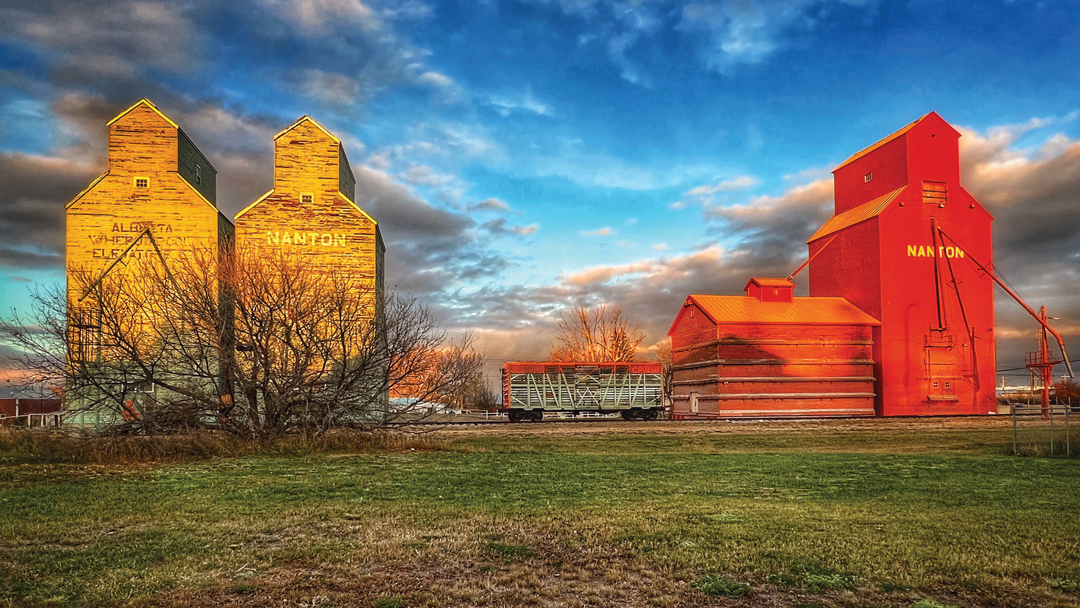
Comments